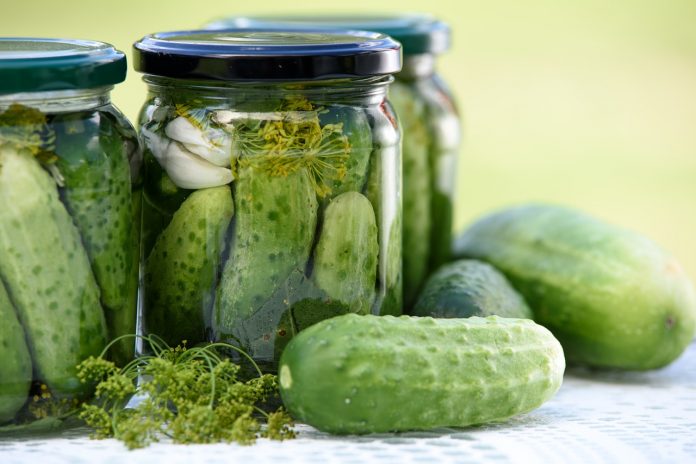We plant plenty of cucumbers in our garden every year because they are my daughter’s favorite. However, sometimes they grow faster than we can eat them all. I guess it’s a good thing Vayda likes pickles, too.
Pickling cucumbers is a good, not to mention tasty, way to safely preserve them. When we can’t pick fresh cucumbers out of the garden during winter, it’s nice to be able to pull a jar of pickles out of the pantry. As long as you follow recipes from reliable sources and keep food safety in mind throughout the pickling process, you can enjoy cucumbers year round too.
Basic tips
- Only use research-tested recipes from reliable sources — those taken from extension sites, the United States Department of Agriculture or the National Center for Home Food Preservation.
- Never alter vinegar, food or water proportions in a recipe.
- To prevent the growth of botulinum bacteria, you need a minimum, even level of acid throughout the prepared product.
- Store processed pickles in a dark, cool, dry place.
Selecting fresh cucumbers
Use the following guidelines to select the best cucumbers for pickling:
- Pick cucumbers early in the day for a better flavor.
- Choose a tender pickling variety. Don’t purchase commercially produced waxed cucumbers for pickling — acid or salt will not penetrate them properly.
- Always select firm, blemish-free cucumbers.
- Choose cucumbers around 1 1/2 inches long for gherkins and 4 inches long for dills.
- Save odd-shaped and more mature cucumbers for relishes and bread-and-butter style pickles.
Calculating yield
To make it simple, you need 1 pound of cucumbers for every pint or 2 pounds for every quart. So an average of 14 pounds is needed per canner load of 7 quarts or an average of 9 pounds is needed per canner load of 9 pints.
Preparing cucumbers
- Wash cucumbers thoroughly, especially around the stem area, to remove soil that may contain bacteria.
- Toss out cucumbers with signs of mold or spoilage.
- Cut off the blossom end to prevent pickle softening.
- Pickle within 24 hours of picking cucumbers.
Other Ingredients
Salt. Use a nonionized canning or pickling salt. Avoid reduced salt products. Always use the correct proportions of salt to ensure proper fermentation and optimum pickle taste.
Vinegar. Always use a high-grade cider or white distilled vinegar of 5 percent acidity. White vinegar is usually used because it helps the cucumbers retain their light color. Never use a vinegar with unknown acidity, never dilute vinegar unless the recipe calls for it and never use homemade vinegar and other products with lower acidity.
Sugar. Some recipes call for sugar to plump pickles and keep them firm. Use white granulated sugar unless the recipe specifically calls for brown sugar. Brown sugar will produce a darker bring and different flavor.
Water. Water plays a key role in the firmness of the finished product. A soft water is recommended for pickling. Very hard water may result in dark or discolored pickles.
Spices. Spices are important for flavoring the vinegar, creating the flavor your cucumber will absorb. Try to use fresh, whole spices for optimum flavor. Powdered spices may cause darkening or cloudy brine. Some recipes may indicate adding spices to each jar and others may tell you to bundle them in a cheesecloth while cooking the brine.
Firming Agents. Alum can be used, but only for fermented pickles. It won’t improve the firmness of quick-packed pickles. You can also try calcium in lime, which helps improve pickle firmness. However, it has to be food-grade and you have to follow the directions carefully. Pickles have to be soaked in calcium in lime and rinsed several times before moving on.
Dill pickle recipe
Now that you know the basics of pickling cucumbers, you might test what you’ve learned with this recipe from the National Center for Home Food Preservation.
Quick Fresh-Pack Dill Pickles
Ingredients
- 8 pounds of 3- to 5-inch pickling cucumbers
- 2 gallons of water
- 1¼ cups canning or pickling salt
- 1½ quarts vinegar (5 percent)
- ¼ cup sugar
- 2 quarts water
- 2 tbsp whole mixed pickling spice
- about 3 tbsp whole mustard seed (2 tsp to 1 tsp per pint jar)
- about 14 heads of fresh dill (1½ heads per pint jar)
or
4½ tbsp dill seed (1½ tsp per pint jar)
Yield: 7 to 9 pints
Directions
- Wash cucumbers.
- Cut 1/16-inch slice off blossom end and discard, leaving ¼-inch of stem attached.
- Dissolve ¾ cup salt in 2 gals water.
- Pour over cucumbers and let stand 12 hours.
- Drain salt water off of cucumbers.
- Combine vinegar, ½ cup salt, sugar and 2 quarts water.
- Add mixed pickling spices tied in a clean white cloth.
- Heat to boiling.
- Fill jars with cucumbers.
- Add 1 tsp mustard seed and 1½ heads fresh dill per pint.
- Cover with boiling pickling solution, leaving ½-inch headspace.
- Adjust lids and process in a boiling-water canner. For pint jars, process for 10 minutes at altitudes of 1-1,000 feet, 15 minutes at altitudes of 1,001-6,000 feet and 20 minutes at altitudes above 6,000. For quart jars, process for 15 minutes at altitudes of 1-1,000 feet, 20 minutes at altitudes of 1,001-6,000 feet and 25 minutes at altitudes above 6,000.
More recipes
Find more research-tested recipes for bread-and-butter pickles, qucik sweet pickles, sweet gherkin pickles, 14-day sweet pickles, quick sour pickles, reduced-sodium dill pickles and reduced-sodium sweet pickles at Clemson Cooperative Extension.














How would I reduce the recipe down. We will only have 2 to 3 pounds of cucumbers. We are first time gardeners, we use wooden half barrels. Thank you very much. Tom
The recipe calls for 8 pounds, so I would just divide the amounts of the ingredients by 4 and follow the directions.
once picled, do you leave them in the brine mixture?
Yes
Can you use Boston Pickling Cucs that are matured(ing) but have yellow bases for pickling?
I was on vacation when my pickling cukes grew HUGE! Can I still use them in this recipe? Do I just trim them to size to fit in the jars? Thanks!
What do you do if you accidentally put a little more sugar (about 2 tablespoons) more than called for in the 7lb cucumber sweet pickle recipe?
Nothing. They will probably just be a little sweeter than normal, but still safe to eat. You could add a little more vinegar to try to balance it out.
Do I heat the jars before packing with the cucumbers or just pour the hot brine into the room temperature jars?
I’m making lime pickles. I have done the liming process and rinsing process. My recipe calls for letting your cucumbers set in the vinegar and spice over night in fridge. Things came up and I wasn’t able to finish the cooking process for two days. Are my pickles a total loss or can I finish the cooking and canning them?
I would say they’re probably fine to can if there are no signs of spoilage.
I have had diarrhea for years.
The medical-laboratory equipment was unable to diagnose the cause of the disease.
I started studying myself.
Every chemical and herbal medicine I used was ineffective.
Hippocrates (father of medical sciences): The sweetness of one victory is worth the bitterness of a hundred defeats.
By accident and miraculously, I got better with fermented pickles.
Hippocrates: Your food should be your medicine.
Fermented pickles are rich in intestinal bacteria.
Fermented pickles are an amazing source of gut bacteria.
Fermented pickles have probiotic properties.
Gut bacteria are called probiotics.
The role of probiotics in the prevention and improvement of disease symptoms:
Probiotics help to restore and grow beneficial mucosal bacteria, especially in the intestines. If the balance of intestinal bacteria is disrupted, intestinal dysfunction occurs, which can cause acne, food allergies, extreme fatigue, depression, headaches, and the most common of all. (often) suffers from chronic diarrhea.
So I came to the conclusion that the beneficial bacteria in my gut were destroyed.
The name of this disease is dysbiosis.
When the pickles ran out, the disease returned.
I made this pickle by accident and miracle with only salt water and cucumber.
I did not use vinegar, pepper, garlic, etc.
How to prepare fermented pickled cucumbers?
Thanks
The only help you give is to like so that the views of the article increase and all people are informed
Don’t forget to like. Let me see what you are doing